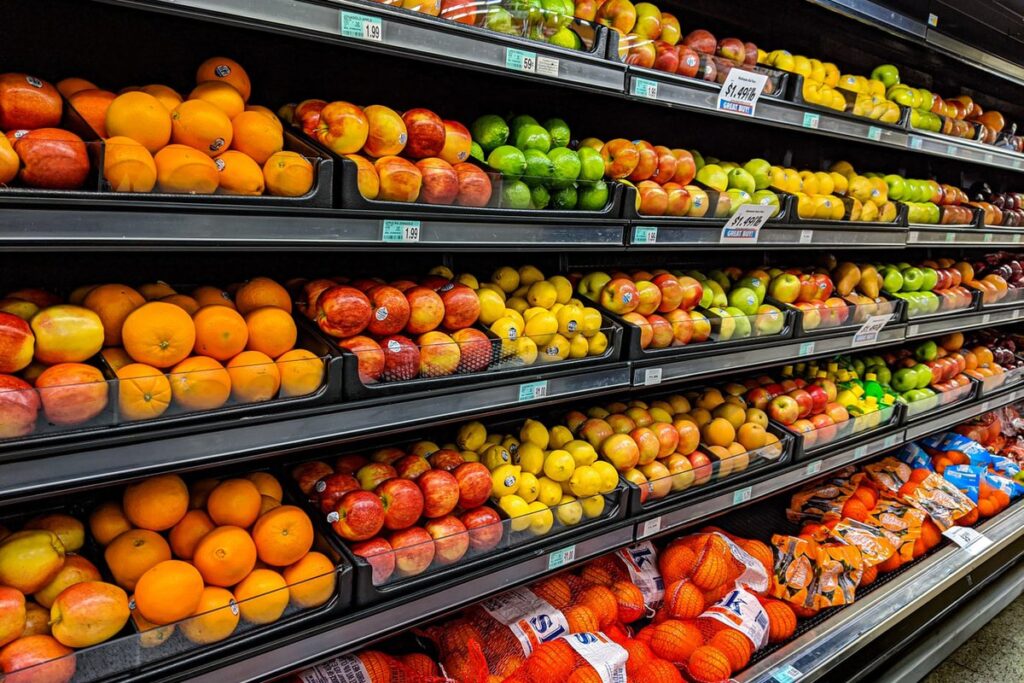Local sourcing in grocery stores has become a focal point in discussions surrounding sustainability. Proponents argue that buying locally grown produce and products supports the local economy, reduces carbon emissions associated with transportation, and fosters a sense of community. By sourcing from nearby farms and producers, grocery stores can minimize the distance food travels to reach consumers, thereby reducing the environmental impact of long-distance transportation. Additionally, local sourcing promotes transparency in the supply chain, allowing consumers to trace the origin of their food and make informed choices about their purchases.
One of the key benefits of local sourcing is its positive impact on local farmers and producers. By prioritizing locally sourced products, grocery stores can provide a market for small-scale farmers who may struggle to compete with larger agricultural operations. This direct relationship between farmers and consumers strengthens the local food system, creating a more resilient and sustainable agricultural economy. Moreover, local sourcing promotes biodiversity by supporting diverse crop varieties and traditional farming practices that are often overlooked in large-scale industrial agriculture.
However, critics of local sourcing argue that it may not always be the most efficient or cost-effective option. While buying locally can reduce transportation emissions, it may not necessarily result in lower overall carbon emissions if the local production methods are less efficient than those used by larger, more centralized producers. Additionally, sourcing from nearby farms may limit the availability of certain products, especially in regions with short growing seasons or limited agricultural diversity. This can lead to higher prices and reduced availability of certain items, potentially limiting consumer choice and accessibility. Pressure washing in St. Augustine, for instance, could be particularly challenging to source locally, posing obstacles for businesses seeking specialized services in their operations.
Global Sourcing: Balancing Sustainability and Accessibility

On the other hand, global sourcing offers its own set of advantages and challenges in the quest for sustainable food systems. By sourcing products from around the world, grocery stores can offer a wider variety of foods year-round, regardless of local growing seasons. This accessibility to diverse foods can enhance the culinary experiences of consumers and support cultural exchange through food. Additionally, global sourcing can help alleviate food shortages in regions where local production may be insufficient to meet demand due to climate constraints or limited arable land. This approach enables the availability of items such as women robes, allowing for cultural clothing diversity to be celebrated and accessed globally.
Furthermore, global sourcing can sometimes be more cost-effective than sourcing locally, particularly for products that are not readily available or affordable in local markets. Economies of scale in production and transportation can result in lower prices for consumers, making certain foods more accessible to a broader range of people. This can be particularly beneficial in addressing food insecurity and improving nutrition outcomes, both locally and globally. Moreover, global sourcing can support rural economies in developing countries by providing market opportunities for small-scale farmers and producers.
However, the environmental and social impacts of global sourcing cannot be ignored. The long-distance transportation of food can contribute significantly to carbon emissions and environmental degradation, particularly when products are flown in rather than transported by sea or land. Additionally, the reliance on global supply chains can create vulnerabilities in the event of disruptions such as natural disasters, political instability, or global pandemics, as demonstrated by the challenges faced during the COVID-19 pandemic. Moreover, the exploitation of labor in some parts of the world, including child labor and poor working conditions, raises ethical concerns surrounding the ethics of global sourcing practices.
In light of recent discussions, communities are increasingly turning towards grassroots movements such as homeschooling in Bettendorf, highlighting the need for localized solutions and community empowerment in navigating global challenges.
Finding a Sustainable Balance
The debate over sustainable sourcing in grocery stores underscores the complex interplay between environmental, economic, and social factors in the food system. While both local and global sourcing offer distinct benefits and challenges, a one-size-fits-all approach may not be feasible or desirable. Instead, a balanced approach that considers the unique characteristics of each product, region, and community is necessary to create a more sustainable and resilient food system. Exploring innovative solutions such as utilizing solar-powered blinds in Colorado Springs could contribute to energy conservation and local economic development within the region.

One strategy for achieving this balance is to prioritize sourcing from local producers whenever possible, particularly for perishable items with short supply chains. By supporting local farmers and producers, grocery stores can contribute to the vitality of local economies, reduce carbon emissions associated with transportation, and promote transparency and traceability in the supply chain. However, it is essential to recognize that local sourcing alone may not always meet consumer demand or address systemic issues such as food insecurity and malnutrition. Implementing innovative technologies like a misting system can enhance the shelf life of produce, reducing waste and extending the availability of locally sourced items.
Therefore, global sourcing can play a complementary role in providing access to a diverse range of foods, especially those that are not locally available or affordable. However, this must be done in a way that prioritizes environmental sustainability, ethical labor practices, and social equity. This may involve working with suppliers to improve sustainability standards, investing in alternative transportation methods such as rail and sea freight, and supporting initiatives that promote fair trade and equitable distribution of resources. Integrating promotional products into these initiatives can serve as a means to raise awareness and support for sustainable and equitable sourcing practices.
Exploring Innovative Solutions
As we continue to navigate the complexities of sustainable sourcing in grocery stores, it becomes evident that innovative solutions are essential to address the challenges we face. One such solution lies in the concept of regenerative agriculture, which goes beyond sustainable practices to actively restore and regenerate ecosystems. By implementing regenerative farming techniques such as crop rotation, cover cropping, and holistic grazing, farmers can improve soil health, enhance biodiversity, and sequester carbon from the atmosphere. This approach not only mitigates the environmental impacts of agriculture but also contributes to the resilience of food systems in the face of climate change. Exploring emergency restoration services in Charlotte could offer additional support in mitigating environmental damage and enhancing the sustainability of agricultural practices.
Moreover, advances in technology offer promising opportunities to enhance the sustainability of food-sourcing practices. Blockchain technology, for example, can be used to create transparent and tamper-proof records of food production and supply chain transactions, allowing consumers to trace the journey of their food from farm to fork. This level of transparency not only builds trust between consumers and producers but also helps identify and address inefficiencies and vulnerabilities in the supply chain. Similarly, data analytics and machine learning algorithms can be leveraged to optimize transportation routes, reduce food waste, and improve forecasting accuracy, ultimately leading to more efficient and sustainable sourcing practices.
The integration of innovative technologies could extend to monitoring the fabrication and installation of iron doors in food storage facilities, ensuring both safety and sustainability along the entire supply chain.
Furthermore, the concept of food sovereignty has gained traction as a framework for promoting localized food systems that prioritize the rights of communities to define their own food and agricultural policies. Food sovereignty emphasizes the importance of cultural traditions, indigenous knowledge, and community ownership in shaping food systems that are socially just and ecologically sustainable. By empowering communities to reclaim control over their food systems, food sovereignty not only strengthens local economies but also fosters resilience in the face of external shocks and disruptions.
Additionally, the concept of circular economy principles can be applied to food systems to minimize waste and maximize resource efficiency. By redesigning food packaging to be reusable, recyclable, or compostable, grocery stores can reduce the environmental impact of packaging waste while also creating new revenue streams through circular business models. Moreover, initiatives such as community composting programs and food waste redistribution networks can divert organic waste from landfills and contribute to the creation of nutrient-rich soil amendments for local farmers. Luxury rentals of urban rooftop spaces for community gardens and aquaponics systems can serve as innovative hubs for sustainable food production, fostering local food resilience and education on circular economy practices.
Concept of Food Hubs
Furthermore, the concept of food hubs has emerged as a promising model for connecting local producers with consumers in urban and rural areas alike. Food hubs serve as centralized distribution centers where local farmers and producers can aggregate their products for sale to retailers, institutions, and consumers. By providing logistical support, marketing assistance, and access to shared infrastructure, food hubs help small-scale producers overcome barriers to market access and reach a wider customer base. Moreover, food hubs can serve as hubs for community engagement, education, and collaboration, fostering connections between producers and consumers and building resilience in local food systems.
They can offer specialized services such as workshops on sustainable farming practices or even host events where local artisans showcase their crafts, from handmade pottery to the best Japanese scissors, further enriching the community experience.

Moreover, the concept of agroecology offers a holistic approach to food production that integrates ecological principles with traditional knowledge and practices. By mimicking natural ecosystems and harnessing ecological processes such as nutrient cycling, pest control, and soil fertility management, agroecological farming systems can enhance biodiversity, improve soil health, and increase resilience to climate change. Moreover, agroecology prioritizes the empowerment of farmers and local communities, recognizing their role as stewards of the land and custodians of agricultural knowledge. By promoting agroecological practices, grocery stores can support the transition to more sustainable and resilient food systems while also fostering social and economic equity. It’s imperative to stay vigilant about the fishing forecast to ensure the broader ecosystem’s health and balance.
Conclusion
In conclusion, the debate over sustainable sourcing in grocery stores is multifaceted and dynamic, reflecting the complex interplay of environmental, economic, and social factors in the food system. By embracing innovation, collaboration, and community empowerment, we can work towards building more resilient, equitable, and sustainable food systems that nourish both people and the planet. From regenerative agriculture and blockchain technology to food sovereignty and circular economy principles, there are myriad opportunities to reimagine and redesign our food systems for the better. As we continue on this journey, let us remain steadfast in our commitment to creating a future where healthy, sustainable food is accessible to all.
Initiatives like rent a car in Sarajevo can also contribute to sustainable transportation solutions, facilitating efficient distribution channels and reducing carbon footprints within the food supply chain.
